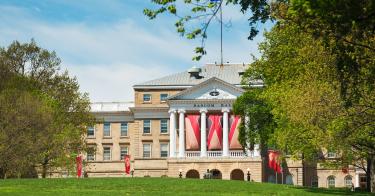Not many colleges, it seems, are willing to stand up for free speech on campus these days. Fortunately, the University of Wisconsin is one of them.
Last fall, its governing board took a bold position in favor of open debate. And, despite claims that protestors would be censored, early signs indicate that ideas on both sides of tough issues are being heard.
“It’s something that has been long overdue in the UW system,” says Jake Lubenow, student chair of the Wisconsin Federation of College Republicans. “There is still a lot of room to work with the administration on planning events, but this is a good first step.”
The university board adopted policies based on the idea that “(s)tudents and employees have the freedom to discuss any problem that presents itself,” with the goal of “fostering the ability of members of the university community to engage in such debate and deliberation in an effective and responsible manner.”
Likewise, the policy states that no one should be allowed to silence someone else: “Protests and demonstrations that materially and substantially disrupt the rights of others to engage in or listen to expressive activity shall not be permitted.”
To protect these rights, the board adopted provisions saying that students or employees that violate someone’s ability to speak or express themselves would face consequences. Individuals who forcibly silence someone else through what is commonly known as the “heckler’s veto,” where one person or a group shouts at an invited lecturer so the speaker cannot be heard or takes over a room to shutter an event, could be suspended or expelled.
The university system already has the ability to suspend or expel students for improper conduct, but the new policy applies such disciplinary measures to the area of free speech.
One critic, state lawmaker Chris Taylor (D-Madison) said the idea “gags and bags the First Amendment.” Another feared conservative students would not be able to speak out issues such as abortion.
Lubenow disagrees. “I think, generally, it hasn’t prohibited anyone from protesting,” he says. “It’s not a complicated policy. If you go into the room, you stop the speech, you’re violating the policy. If you don’t, you’re not.”
Wisconsin isn’t the first to consider these measures. In 1974, a Yale commission prescribed this in the wake of Vietnam War and Civil Rights protests. North Carolina legislators adopted similar ideas in state law last year. Lawmakers in Arizona, California and Missouri, to name a few, are considering proposals.
University of Wisconsin students may remember when protestors shouted down conservative speaker Ben Shapiro in 2016, but those on the other side of the political divide have taken their lumps, too. Evergreen State College in Washington State was locked down amid protests last year. The school had to delay graduation after confrontations between left-leaning students and a professor over whether white individuals should be forced off of campus for a day.
The Wisconsin policy is now almost six months old, and protests have continued — but shout-downs and speaker disruptions are thinning.
Lubenow cites two recent lectures featuring right-of-center ideas where protests or counter-events took place without substantial interference. TownHall.com editor Katie Pavlich spoke on the Madison campus in October 2017, and one report said protestors decided not to block the event because of the new university policy on consequences for free speech violations. Students still held a demonstration.
Jordan B. Peterson, a professor at the University of Toronto spoke on campus in November on “political indoctrination,” and Lubenow says protests occurred outside the building but did not interfere. The Daily Cardinal reports that a student group opposed to Peterson’s ideas held a “Pronouns Workshop” at the same time.
The state university governing board has committed itself to “promote lively and fearless exploration, deliberation, and debate of ideas, but also to protect those freedoms when others attempt to restrict them,” and violent protesters are having second thoughts. This should be reassuring to those on both sides of every issue.
This piece originally appeared in Journal Sentinel




